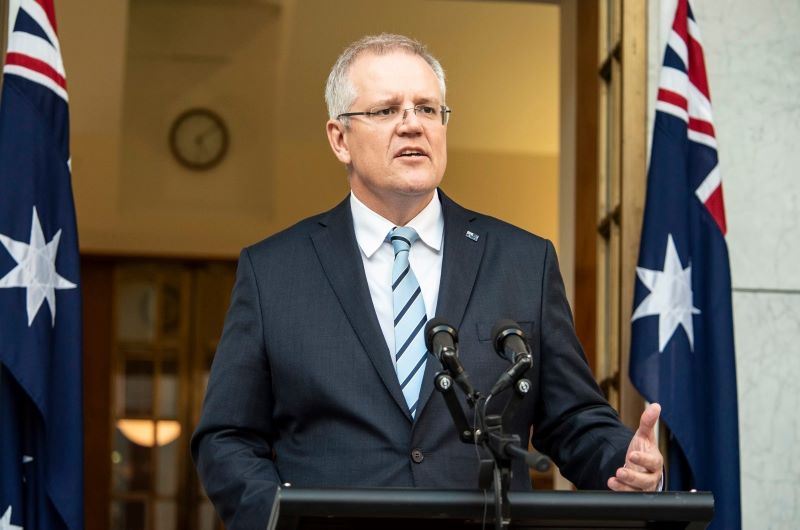Equipping professional accountants for sustainability
The International Federation of Accountants has developed a concise resource to guide accounting professionals and...
READ MORE
Business and industry must work with the Australian government to boost Australia’s skilled workforce, Prime Minister Scott Morrison told one of Australia’s leading industry groups on Tuesday (30 November).

In his virtual address to the Australian Industry Group, Scott Morrison said meeting the needs of the future workforce is not about “what people want to teach” but building “skills in critical sectors to maintain Australia’s global competitiveness and sovereign capabilities” and encouraging “employers to take responsibility to upskill their own workers”.
“It’s never lost on me that the decisions we take as a government, of course, impact on you and your businesses, your members, your employees, your suppliers and the wider community in profound ways,” Mr Morrison said.
He said the temporary pause on the entrance of international skilled workers and migrants to Australia due to the Omicron variant was necessary to ensure the safety of all Australians.
“Skilled migration, of course, will be part of that solution [to alleviate skill shortages], and we are taking a responsible path to gradually reopening those borders, as I mentioned earlier, and targeted migration to fill critical skills and labour gaps will continue to play an important role,” he said.
Despite the struggle by business and industry to find skilled workers, Mr Morrison said the future looks bright with job ads now at their highest level in 13 years.
“We’ve seen encouraging signs about the increase in jobs post the Delta lockdowns from the Australian Bureau of Statistics payroll data, and 350,000 jobs in five weeks have come on,” he said.
“But the strong recovery does present us with a workforce challenge to ensure that we have enough workers and enough trained workers to fill vacancies and ensure that our recovery is not held back. This is a difficult challenge. Was a challenge before the pandemic.”
The government has doubled the number of Pacific workers to meet workforce shortages in regional Australia, bringing in an extra 12,500 by March of next year and has also started work on progressing its new agricultural visa.
But Mr Morrison said the core focus of government, business and industry is on getting Australians into the workforce and increasing their skills.
To support this Mr Morrison said the government has committed a record $6.4 billion in skills and training this year to help develop the skills of Australians, through programs such as the JobTrainer program that will help upskill around 460,000 people.
“These programs are vital because we will need a skilled domestic workforce to take advantage of these opportunities,” he said.
It is estimated there will be 1 million new jobs created within the next five years but Mr Morrison warned that employers need to support creating a workforce that meets specific industry needs.
“While this presents a great opportunity for Australians out of work or seeking additional work, it also presents risks for employers and the wider economy if we don’t have the workforce with the required skills to meet employer’s needs,” he said.
“I consider this one, if not one of, our biggest challenge to our economic recovery is getting the skills in the workforce.”
Australia, like many other countries, is shifting towards higher skilled jobs that means there needs to be put in place a world-class training system designed to better match employer needs and jobseeker skills.
Mr Morrison said there needs to be targeted assistance to jobseekers who need the most help to get a job or undertake further training, and engage businesses so the training system reflects the skills that employers need.
Meanwhile, the Australian Chamber of Commerce and Industry said although it is disappointed in the delay in opening international borders and its consequence to business, it feels the decision was appropriate.
“The two-week pause on international arrivals is a regrettable but necessary decision,” ACCI chief executive Andrew McKellar said.
“Delaying the arrival of skilled migrants and international students is a sensible precaution while health authorities assess the efficacy of the vaccines in the face of the Omicron variant.
“This announcement makes clear that the pandemic is far from over. With more variants likely in the future, the Federal and state governments must ensure systems are in place to respond to new strains.
“As businesses are only just beginning to recovery from the most recent round of lockdowns and restrictions, they cannot afford to wait any longer than is absolutely necessary to begin the reopening of our borders. Bringing skilled migrants, international students and other visa holders into Australia is critical to boosting our economic recovery.
“It’s critical that any future measures are targeted and proportionate, ensuring that Australia’s borders reopen and stay open. Imposing restrictions any longer than is absolute necessary will increase uncertainty and could derail our post-pandemic recovery.”